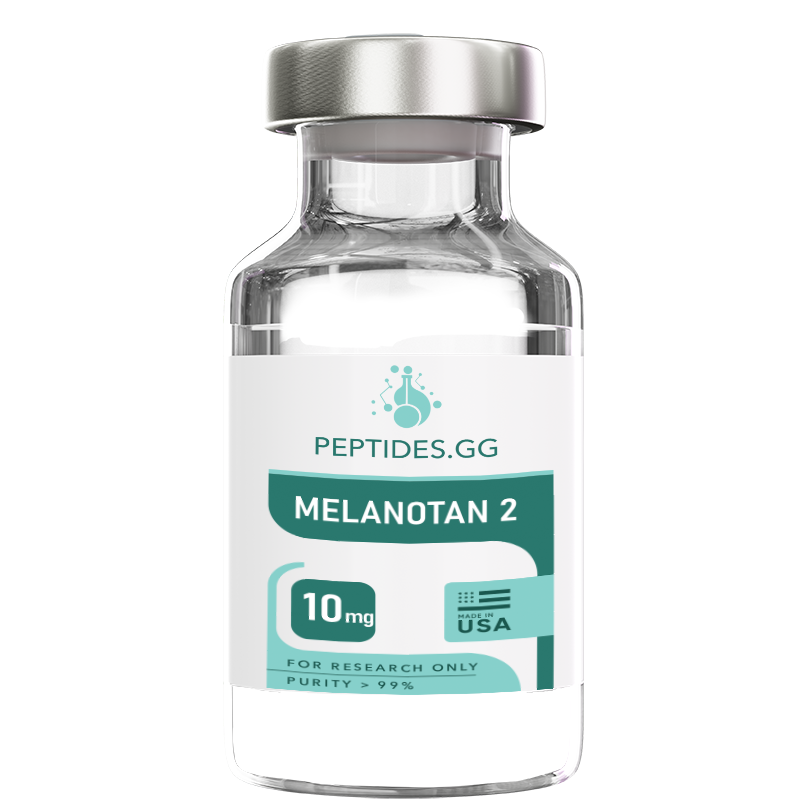Melanotan 2
Melanotan 2
- Enhances Skin Tanning
- Increases Libido
- Reduces UV Damage
- Boosts Melanin Production
Price:
Couldn't load pickup availability
-
Free Delivery on all orders over $200
Earn 5% Store Credit with Every Order
Same Day Shipping Before 1 PM PST
10% Discount for Cryptocurrency Payments



Melanotan 2
Product Description
Melanotan 2(MT2) Research
Melanotan 2 and Its Role in Melanocortin System Activity
Melanotan 2 operates through its interaction with the melanocortin receptors. Among the five identified types of melanocortin receptors, each carrying out distinct roles, MT-2 primarily targets MC-4R and MC-1R, with a lesser affinity for MC-3R.
- MC-1R: Present on melanocytes, its activation leads to the darkening of both skin and hair.
- MC-2R: Located in adrenal glands, its stimulation triggers the release of adrenal hormones, including cortisol.
- MC-3R: Plays a part in managing appetite and energy balance, though its full role remains somewhat unclear.
- MC-4R: Its activation influences feeding behaviors, sexual activity, male erectile functions, and energy management.
- MC-5R: Found in sweat glands and cells of the pancreatic islets
Melanotan 2's Impact on Autism
Recent advances suggest Melanotan 2 might alleviate certain autistic characteristics in a mouse model used for studying autism spectrum disorder (ASD), which currently lacks a definitive cure. While oxytocin therapy shows promise in addressing some ASD-related behavioral issues, new research exploring MT2’s potential to stimulate oxytocin release has been noteworthy. Studies demonstrate MT-2’s ability to enhance social interaction, communication, and reduce repetitive behavior typical of autism in this model. Notably, MT-2 treatment led to an increase in oxytocin receptor expression in particular brain regions, highlighting a link between oxytocin activity there and ASD traits.
Melanotan 2's Effect on Appetite and Fat Storage
Strong evidence supports that MT-2 can diminish hunger and fat accumulation in animal studies. It leverages the melanocortin-4 receptor (MC-4R), implicated in food choice and consumption, acting as a strong MC-4R agonist. When administered to mice, MT-2 significantly cuts down their food intake and alters their preference away from fatty foods. Contrastingly, mice lacking MC-4R showed a predilection for fatty foods, unaffected by MT-2. The peptide’s actions parallel the hormone leptin, known for regulating hunger. However, unlike leptin, which has shown limited obesity treatment efficacy, MT-2 impacts both leptin-dependent and independent satiety pathways, marking it as potentially more effective in curbing hunger.
Melanotan 2 and Diabetes Management
Diabetes is characterized by elevated blood sugar levels, excessive glucagon production, and ketone bodies formation. While leptin counters these by boosting glucose uptake and suppressing glucagon production independently of insulin, its inability to efficiently cross the blood-brain barrier limits its therapeutic use. Conversely, MT-2 shares similar melanocortin receptor effects with leptin but more efficiently accesses the CNS, offering an edge in potentially managing diabetes.
Melanotan 2, Craving Control, and Alcohol Consumption
In the domain of controlling impulses and managing alcohol intake, insights into the MC-4R receptor's role emerge. Studies in rodents indicate MT-2’s ability to reduce alcohol consumption while enhancing water intake, even among alcohol-preferring subjects. Further research highlights its significant synergy with naltrexone, drastically curtailing binge-like ethanol consumption in mice. This positions MT-2 not only as a prominent candidate for tackling alcohol-related disorders but also opens doors to understanding the broader mechanisms underlying cravings and desire within the brain, potentially illuminating pathways relevant to impulsive behavior across various aspects of life.
Melanotan 2 in Addressing Erectile Dysfunction
Erectile dysfunction (ED), primarily linked to vascular concerns, sees effective treatment in most cases with sildenafil (Viagra) and other blood flow-improving medications. Nonetheless, these treatments do not assist all individuals, leaving a gap that MT-2 potentially fills due to its central nervous system activities. In studies, a notable portion of men unresponsive to Viagra benefited from MT-2 treatment, showcasing its broad applicability beyond conventional ED medications, potentially offering new hope for conditions such as hypoactive sexual desire disorder among both men and women.
Take advantage of the discounted offer and order your product today!
Order yours nowCustomer Reviews

Free delivery
On all orders over $200
Earn 5% of
Every order in store credit
Same Day Shipping
On All Orders Placed Before 1 PM PST
- Choosing a selection results in a full page refresh.
- Opens in a new window.

